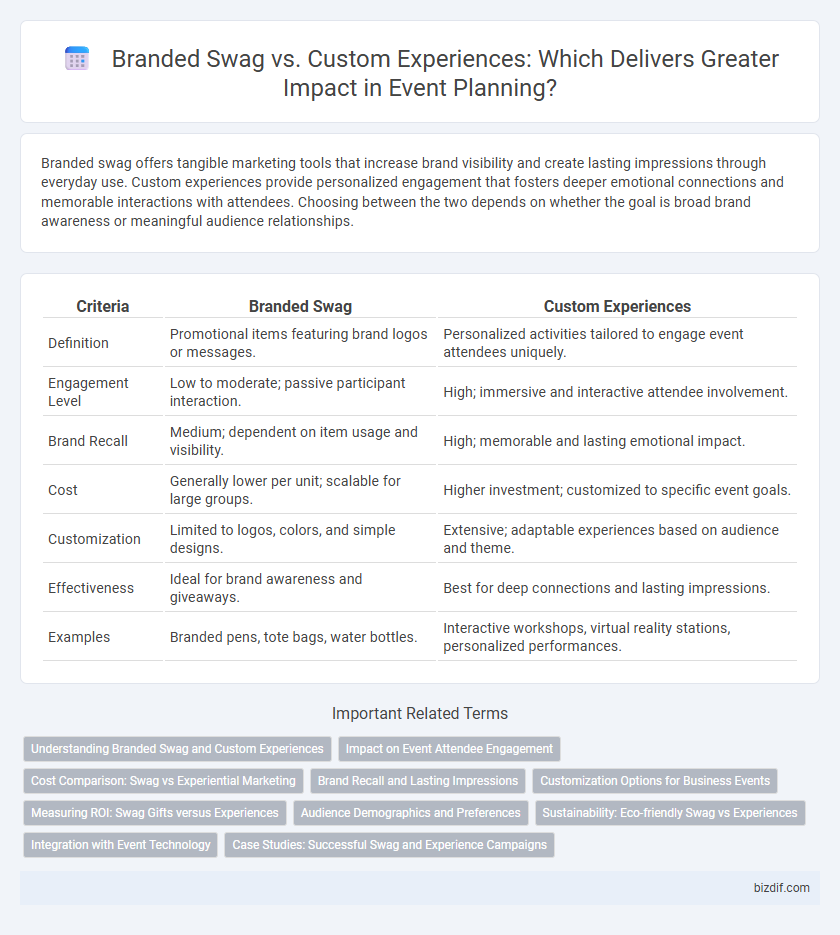Branded swag offers tangible marketing tools that increase brand visibility and create lasting impressions through everyday use. Custom experiences provide personalized engagement that fosters deeper emotional connections and memorable interactions with attendees. Choosing between the two depends on whether the goal is broad brand awareness or meaningful audience relationships.
Table of Comparison
| Criteria | Branded Swag | Custom Experiences |
|---|---|---|
| Definition | Promotional items featuring brand logos or messages. | Personalized activities tailored to engage event attendees uniquely. |
| Engagement Level | Low to moderate; passive participant interaction. | High; immersive and interactive attendee involvement. |
| Brand Recall | Medium; dependent on item usage and visibility. | High; memorable and lasting emotional impact. |
| Cost | Generally lower per unit; scalable for large groups. | Higher investment; customized to specific event goals. |
| Customization | Limited to logos, colors, and simple designs. | Extensive; adaptable experiences based on audience and theme. |
| Effectiveness | Ideal for brand awareness and giveaways. | Best for deep connections and lasting impressions. |
| Examples | Branded pens, tote bags, water bottles. | Interactive workshops, virtual reality stations, personalized performances. |
Understanding Branded Swag and Custom Experiences
Branded swag offers tangible promotional items featuring a company's logo or message, designed to increase brand recognition and provide attendees with memorable keepsakes. Custom experiences create immersive, personalized interactions that engage participants on a deeper emotional level, often resulting in stronger brand loyalty and long-term impact. Both strategies leverage unique touchpoints to enhance event success, with branded swag focusing on visual identity and custom experiences emphasizing meaningful engagement.
Impact on Event Attendee Engagement
Branded swag offers tangible takeaways that reinforce event messaging and increase brand recall among attendees through practical, memorable items like apparel and gadgets. Custom experiences create immersive, personalized interactions that foster deeper emotional connections and stronger attendee engagement by encouraging active participation. Combining both strategies maximizes impact by blending lasting brand visibility with meaningful, memorable event moments.
Cost Comparison: Swag vs Experiential Marketing
Branded swag often involves lower upfront costs, making it a cost-effective option for events with budget constraints; items like custom T-shirts, mugs, or tote bags can be produced in bulk at a significantly lower price per unit. Experiential marketing, while generally more expensive due to immersive setups, interactive installations, and staff engagement, tends to deliver higher attendee engagement and stronger brand recall, potentially leading to greater long-term ROI. Event planners must weigh the immediate affordability of swag against the impactful, but costlier, immersive experiences to align with overall marketing goals and budget allocations.
Brand Recall and Lasting Impressions
Branded swag enhances brand recall by providing tangible, logo-emblazoned items that attendees use repeatedly, embedding the brand into their daily lives. Custom experiences create lasting impressions through memorable, personalized interactions that foster deeper emotional connections and brand loyalty. Combining both strategies maximizes overall event impact by reinforcing visual brand recognition while delivering unique, engaging moments.
Customization Options for Business Events
Customization options for business events extend beyond branded swag by incorporating interactive and tailored experiences that resonate with attendees. Personalized workshops, immersive activities, and bespoke entertainment foster deeper engagement and align closely with brand values. Leveraging data-driven insights enables precise customization, enhancing the overall impact and memorability of the event.
Measuring ROI: Swag Gifts versus Experiences
Measuring ROI for branded swag focuses on tangible benefits like increased brand visibility and recall, often tracked through redemption rates and social media engagement. In contrast, custom experiences yield deeper emotional connections and higher attendee satisfaction, measurable via post-event surveys and repeat attendance. Both approaches contribute to brand loyalty, but experiences typically offer more substantial long-term ROI through enhanced customer relationships.
Audience Demographics and Preferences
Audience demographics and preferences play a crucial role in choosing between branded swag and custom experiences for event planning. Younger, tech-savvy attendees often value interactive and personalized experiences that foster engagement, while older or more traditional audiences might appreciate tangible branded swag items that provide lasting reminders of the event. Tailoring the approach based on age, interests, and cultural background ensures greater attendee satisfaction and brand impact.
Sustainability: Eco-friendly Swag vs Experiences
Eco-friendly branded swag offers tangible, reusable items made from sustainable materials like organic cotton or recycled plastics, reducing single-use waste and promoting brand visibility long after the event. Custom experiences minimize environmental impact by eliminating physical waste altogether and fostering meaningful connections through activities such as virtual workshops or local eco-tours. Prioritizing sustainability in event planning involves evaluating the carbon footprint, lifecycle, and participant engagement of swag items versus immersive experiences.
Integration with Event Technology
Branded swag offers seamless integration with event technology by incorporating QR codes and NFC tags that enhance attendee engagement and tracking. Custom experiences can be elevated through interactive digital platforms and AR/VR applications, providing personalized, immersive interactions that resonate with event goals. Both approaches leverage data analytics to optimize event outcomes and foster meaningful connections between brands and participants.
Case Studies: Successful Swag and Experience Campaigns
Case studies reveal that branded swag campaigns, such as Coca-Cola's holiday merchandise drives, boost brand visibility and customer loyalty through tangible, high-quality items. In contrast, custom experience campaigns like Airbnb's local host events foster deeper emotional connections, enhancing user engagement and long-term retention. Both approaches demonstrate measurable ROI, with swag excelling in immediate brand reinforcement and custom experiences driving sustained community-building impact.
Branded swag vs Custom experiences Infographic

 bizdif.com
bizdif.com